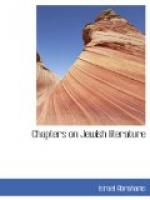BIBLIOGRAPHY
ETHICAL LITERATURE.
Steinschneider.—Jewish Literature, pp. 100, 232.
B.H. Ascher.—Choice of Pearls
(with English translation,
London, 1859).
D. Rosin.—Ethics of Solomon Ibn Gebirol,
J.Q.R.,
III, p. 159.
BACHYA.
Graetz, III, p. 271.
YEDAYA BEDARESSI.
Graetz.—IV, p. 42 [45].
J. Chotzner.—J.Q.R., VIII, p. 414.
T. Goodman.—English translation of Bechinath Olam (London, 1830).
ETHICAL WILLS.
Edelmann.—The Path of Good Men (London, 1852).
I. Abrahams, J.Q.R., III, p. 436.
CHAPTER XX
TRAVELLERS’ TALES
Eldad the Danite.—Benjamin of Tudela.—Petachiah of Ratisbon.—Esthori Parchi.—Abraham Farissol.—David Reubeni and Molcho.—Antonio de Montesinos and Manasseh ben Israel.—Tobiah Cohen.—Wessely.
The voluntary and enforced travels of the Jews produced, from the earliest period after the destruction of the Temple, an extensive, if fragmentary, geographical literature. In the Talmud and later religious books, in the Letters of the Gaonim, in the correspondence of Jewish ambassadors, in the autobiographical narratives interspersed in the works of all Jewish scholars of the Middle Ages, in the Aruch, or Talmudical Lexicon, of Nathan of Rome, in the satirical romances of the poetical globe-trotters, Zabara and Charizi, and, finally, in the Bible commentaries written by Jews, many geographical notes are to be found. But the composition of complete works dedicated to travel and exploration dates only from the twelfth century.
Before that time, however, interest in the whereabouts of the Lost Ten Tribes gave rise to a book which has been well called the Arabian Nights of the Jews. The “Diary of Eldad the Danite,” written in about the year 880, was a popular romance, to which additions and alterations were made at various periods. This diary tells of mighty Israelite empires, especially of the tribe of Moses, the peoples of which were all virtuous, all happy, and long-lived.
“A river
flows round their land for a distance of four
days’ journey
on every side. They dwell in beautiful houses
provided with handsome
towers, which they have built
themselves. There
is nothing unclean among them, neither in
the case of birds, venison,
nor domesticated animals; there
are no wild beasts,
no flies, no foxes, no vermin, no
serpents, no dogs, and,
in general, nothing that does harm;
they have only sheep
and cattle, which bear twice a year.
They sow and reap, they
have all kinds of gardens with all
kinds of fruits and
cereals, beans, melons, gourds,




